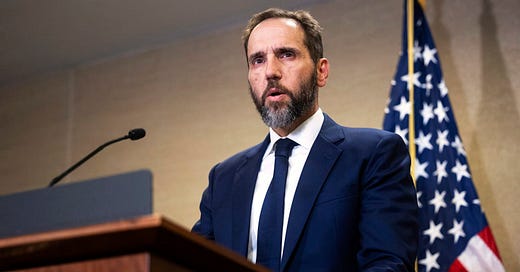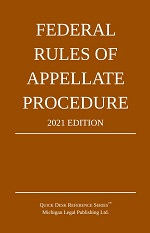On Tuesday, Special Counsel Jack Smith’s opening brief is due in the Eleventh Circuit, where he’s appealing Judge Cannon’s decision to dismiss his prosecution of Donald Trump for mishandling classified documents and obstructing the investigation into his crimes. Judge Cannon ruled in July that the process used to appoint the Special Counsel was unconstitutional and dismissed the case on that basis.
Notably, no other judge to consider the issue has ruled that way, and prosecutions conducted by special counsels have been routine, if infrequent.
So, what can we expect from the prosecution’s opening brief?
This is an “interlocutory” appeal before trial, meaning the only issue before the court is whether Judge Cannon’s decision to dismiss was correct. The Eleventh Circuit will decide whether or not a special counsel like Jack Smith, who came in from outside of government, can prosecute a case when the attorney general determines one is necessary.
The parties may try to inject two other issues, as well. Trump will undoubtedly try to argue the entire case should be dismissed because of the Supreme Court’s immunity decision. That issue isn’t properly before the court on this appeal, and the Eleventh Circuit applies very strict rules about only hearing issues that are. We’ll see if that holds up in Trump’s case, as it should. But we’ll likely see the word immunity more than once in Trump’s brief, even though this is only supposed to be the government’s appeal of the Judge’s decision against them, dismissing the case because Judge Cannon believes that the Special Counsel’s appointment was unconstitutional.
The issue that is more likely to find its way into the appeal is whether Judge Cannon should remain on the case if the indictment is reinstated. If they win this appeal, the government could ask the court to reassign the case to a new judge. They could also stay silent on that issue and leave it up to the court, hoping the three-judge panel will act on its own. That has happened in other cases in the Circuit, where a trial judge’s decisions resulted in multiple reversals on appeals involving related issues.
Jack Smith never asked Judge Cannon to recuse herself. If he had, she would have been required to explain the basis for her decision in a written order if she declined to recuse. That would have given the government (and the court) a record to work with. Absent that, the government could argue that her decision to dismiss, on top of Judge Cannon’s earlier errors, means it would be better to send the case back to a new district judge, who could give the case a fresh look.
In U.S. v. Martin, the 11th Circuit case we’ve discussed previously, a district judge repeatedly issued shockingly low sentences in a substantial white-collar fraud case. The Eleventh Circuit ruled, “In light of the two reversals in this case and three other appeals in which we have reversed the same judge for extraordinary downward departures that were without a valid basis in the record, we find it likely that ‘the original judge would have difficulty putting his previous views and findings aside.’” Given Judge Cannon’s early decisions in a related matter, where she tried to prevent the government from even using evidence obtained during the search of Mar-a-Lago, and continuing through to dismissing the case outright, it would be appropriate for either the government or the court to suggest that the interests of justice would be best served by reassigning the matter.
Of course, Jack Smith would have to get his case back in court for the identity of the judge to matter. He should win this appeal outright, given a number of prior decisions in the District of Columbia that go his way, but even if he doesn’t, the decision is not a substantive one about the merits of the prosecution but rather one about whether a special counsel can bring the case. Even if the Eleventh Circuit were to affirm Cannon’s decision dismissing the case, the local U.S. Attorney in Miami could reindict it.
That’s the state of play for the case. Tuesday, Jack Smith files his opening brief. Trump will have the opportunity to respond and Smith will get to file a reply brief. Under Rule 31 of the Federal Rules of Appellate Procedure, “The appellee must serve and file a brief within 30 days after the appellant's brief is served. The appellant may serve and file a reply brief within 21 days after service of the appellee's brief.” Neither party has sought to expedite the case.
When we see the brief itself, it will consist of the following parts:
A cover page with the name of the case and other administrative information.
A certificate of interested persons and corporate disclosure statement. This lets the judges know who the people with interests in the outcome of a case are, so they can recuse if appropriate.
A statement regarding oral argument. Both the appellant (the United States) and the appellee (Trump) let the Court know whether they want oral argument or think the court should decide the case based on the briefs. The rules note that the “court will accord these statements due, though not controlling, weight in determining whether oral argument will be heard.” Oral argument seems likely here, given that this issue is both novel and important.
A table of contents. I find this to be an excellent overview of the arguments being made in the brief, and I usually start here. Don’t overlook it.
A table of citations. This is mostly of interest to lawyers because it lists the court cases the brief relies on.
A statement of jurisdiction, explaining why the court has jurisdiction to hear the case.
A statement of the issue(s) that the court should decide.
A statement of the case, which describes what happened in the lower court and, most importantly, lays out the facts of the case for the appellate court, with citations to the record of the proceedings below to show it’s all accurate. The statement of the facts is important. My father-in-law, a federal appellate judge, once explained to me what he called the “clearly guilty rule.” Basically, the government’s job on appeal is a lot easier if the court has no reason to question the defendant’s guilt. That matters less here, where the appeal is on a technical legal issue, but it will still be interesting to see how the government portrays the case. The government also tells the court what standard of review it should use to assess the lower court’s decision. Here, because it’s a pure legal issue, they will look at it with fresh eyes and aren’t required to defer to the district judge’s decision in any way.
A summary of the argument, which is a great way to get a flavor of the argument if you don’t want to read the whole brief. It will be a couple of pages long, setting out the contours of the argument.
The argument itself.
This case only moves forward if Trump loses the election. If he wins, he will undoubtedly put a new attorney general in place who will end the prosecution. But if Trump loses, this case will move forward even if the government loses this appeal. That’s because the issue here is only about who can bring the case, not about whether it can be brought at all. If the Special Counsel loses this case, the local U.S. Attorney in Miami would still be able to reindict Trump. The government has an interest in seeing the special counsel process upheld so it can be used in future cases, so it’s very likely they’ll let this case play out in hopes of getting Judge Cannon reversed. But even if they lose, the case isn’t over, so long as Trump can’t abuse presidential power to terminate it.
On Tuesday, we’ll have the brief itself to review. And then, on Friday, we’ll have the status report in the election interference case in Washington, D.C., which DOJ previously asked Judge Chutkan for a few extra weeks to file. That means that with the convention over, even though there will still be intense focus on politics, we’ll be back to discussing the law and specifically the prosecutions of Donald Trump, as well.
We’re in this together,
Joyce







I cannot conceive of our country if trump wins this election. He is a career criminal. He has no intention of doing anything to benefit anybody besides himself. I am all in with Harris/Walz. Their candidacy has given me hope for the first time since vile trump came on the scene.
Hard to believe that a case which seems to be so clear cut, to have taken this long to essentially go nowhere. If our justice system is working as intended, the system needs a major overhaul. Maybe the voters will have the last word on this and other proceedings against the ex president.